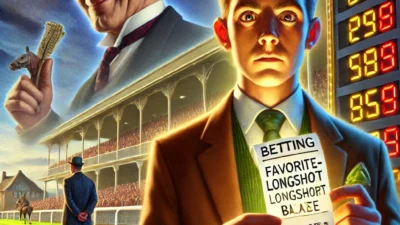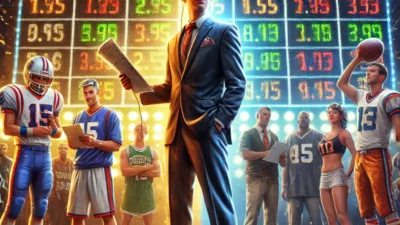The gambler’s fallacy, a common cognitive bias, refers to the erroneous belief that past random events influence future outcomes. This fallacy leads bettors to expect that outcomes will “balance out” over time, resulting in predictions that contradict the inherent randomness of the events. For example, bettors may believe that after a winning streak, a loss is “due,” or vice versa, leading to negatively autocorrelated decisions, where the outcome of one bet is thought to influence the next (Chen et al., 2016).
In lottery play, the gambler’s fallacy is particularly evident. After a number is drawn, bettors often avoid choosing that number in subsequent draws, falsely assuming it is less likely to appear again (Clotfelter & Cook, 1993). Despite being a logical fallacy, this belief persists because people naturally seek patterns in randomness, even when none exist.
Interestingly, research suggests that the gambler’s fallacy is linked to strong cognitive abilities but weak affective decision-making (Xue et al., 2012). This means that individuals who are good at processing information may still fall prey to irrational betting decisions driven by emotional biases, particularly when it comes to risk-taking.
The duration between trials can also affect the strength of the gambler’s fallacy. In settings where there is a longer time between events (such as in some gambling environments), the fallacy may become more pronounced, as people are more likely to believe that outcomes will return to a “normal” state after an extended period (Militana et al., 2010).
In online gambling, the gambler’s fallacy paradoxically can create what is known as the hot hand effect. Here, winners may shift towards safer bets while losers take on riskier bets in an attempt to recover losses. This behavior is a direct manifestation of the gambler’s fallacy, as players believe their past outcomes influence their future chances, even though the odds remain the same (Xu & Harvey, 2014).
The gambler’s fallacy is particularly prevalent among less experienced decision-makers who have not yet internalized the randomness of gambling events. It is also more pronounced when incentives for accuracy are weaker, meaning that individuals are not as motivated to make logically sound decisions and are more susceptible to emotional and irrational thinking (Chen et al., 2016). In summary, the gambler’s fallacy underscores a critical challenge in sports betting and gambling in general, as it distorts decision-making processes and leads bettors to engage in patterns of thought that are not supported by statistical evidence. Understanding this fallacy is crucial for developing more rational, informed betting strategies and improving decision-making in high-stakes settings.
Bettors may believe that after a winning streak, a loss is “due,” or vice versa, leading to negatively autocorrelated decisions, where the outcome of one bet is thought to influence the next
Summary of: Chen Et al 2016
Anecdote
Have a story to share? Write to us at research@bettingresearch.org if you have a related, personal experience you would like to see placed here and share with the community.
Articles Cited
- “Bettina Studer, Eve H. Limbrick-Oldfield, L. Clark (2014): ‘Put Your Money Where Your Mouth Is!’: Effects of Streaks on Confidence and Betting in a Binary Choice Task, https://doi.org/10.1002/bdm.1844
- The paper examines the effects of outcome runs and winning/losing streaks on gambling behavior, including color predictions and betting behavior, in a binary choice roulette task.”
- “C. Clotfelter, P. Cook (1993): Notes: The Gambler’s Fallacy in Lottery Play, https://doi.org/10.1287/MNSC.39.12.1521
- The paper provides evidence that lottery players exhibit the gambler’s fallacy, the belief that the probability of an event is lowered when that event has recently occurred, even though the probability is objectively independent from one trial to the next.”
- “Daniel L. Chen, T. Moskowitz, K. Shue (2016): Decision-Making Under the Gambler’s Fallacy: Evidence from Asylum Judges, Loan Officers, and Baseball Umpires, https://doi.org/10.2139/ssrn.2538147
- The paper presents consistent evidence across three high-stakes field settings that decision-makers exhibit negatively autocorrelated decision-making that is unrelated to the merits of the cases considered, and is most consistent with the gambler’s fallacy and/or sequential contrast effects.”
- “Gui Xue, Qinghua He, Xuemei Lei, Chunhui Chen, Yuyun Liu, Chuansheng Chen, Zhonglin Lu, Q. Dong, A. Bechara (2012): The Gambler’s Fallacy Is Associated with Weak Affective Decision Making but Strong Cognitive Ability, https://doi.org/10.1371/journal.pone.0047019
- The paper examines the hypothesis that the gambler’s fallacy is associated with weak affective decision making but strong cognitive ability.”
- “Erika Militana, Elizabeth Wolfson, J. Cleaveland (2010): An effect of inter-trial duration on the gambler’s fallacy choice bias, https://doi.org/10.1016/j.beproc.2010.02.010
- The study found that the gambler’s fallacy bias is stronger when the time between trials is longer (6 seconds) compared to when it is shorter (2 seconds).”
- “Daniel L. Chen, T. Moskowitz, K. Shue (2016): Decision-Making under the Gambler’s Fallacy, –
- The authors find consistent evidence of negative autocorrelation in high-stakes decision-making across three different field settings, which they attribute to the gambler’s fallacy and the law of small numbers leading decision-makers to underestimate the likelihood of sequential streaks occurring by chance.”
- “C. Clotfelter, P. Cook (1991): The “”Gambler&Apos;S Fallacy”” in Lottery Play, https://doi.org/10.3386/w3769
- The paper provides evidence that lottery players exhibit the gambler’s fallacy, the belief that the probability of an event is lowered when that event has recently occurred, even though the probability is objectively independent from one trial to the next.”
- “Juemin Xu, N. Harvey (2014): Carry on winning: The gamblers’ fallacy creates hot hand effects in online gambling, https://doi.org/10.1016/j.cognition.2014.01.002
- Online sports gamblers suffer from the gamblers’ fallacy, leading them to choose safer odds after winning and riskier odds after losing, which creates a “”hot hand”” effect that is not due to actual luck.”
Insufficient Detail?
At times it is difficult to answer the question as there are not enough relevant published journal articles to relate. It could be that the topic is niche, there’s a significant edge (and researchers prefer not to publish), there is no edge or simply no one has thought to investigate.



